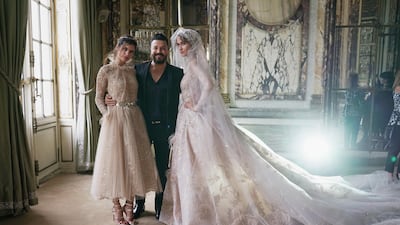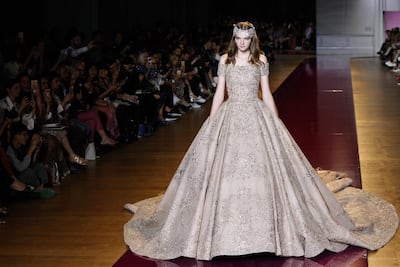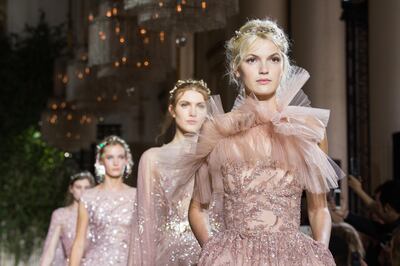"Couture is the heart of fashion. For me, it's an art, like painting, like music," says Zuhair Murad.
I am sitting across from the famed Lebanese couturier in his atelier in Beirut. Having dressed some of the world's most beautiful women, in exquisite gowns made entirely by hand, Murad could be forgiven for being a little aloof. Yet here he sits, smiling and utterly charming, as if he has all the time in the world.
With a fashion empire that spans haute couture, ready-to-wear, bridal, shoes and accessories, Zuhair Murad is a very busy man. Based in Beirut, he is actively involved in every facet of his company – from the initial designs through to the production of fashion shows in Paris (where he has a second atelier). But, despite being a self-confessed workaholic, Murad has that very particular skill of making you feel as if you are the most important thing in his day. I tell him I feel fortunate to have caught him during a week that is a little quieter than normal, and see a flash of mischief in his eyes. "Just a little quieter," he counters.
It is always difficult to pinpoint exactly what lies at the heart of a designer's success, but in Murad's case, it would probably be his uncanny ability to halt time and conjure up parallel microcosms where everyday life seems to slide away. His couture collections, waves of whispering silk laden with intricate beading and embroidery, seem to be perennially illuminated by a romantic half-light. Like a magician, he has the ability to transport us to a softer, more beautiful place.

Born in Ras Baalbek in 1971, Murad is clearly proud of his heritage and all that it has instilled in him. "I grew up in this beautiful country, with all this beautiful nature and these beautiful women," he tells me. "It is filled with positive people and positive vibes; even during the war, they never gave up. They are always happy and enjoying life."
Pre-war Beirut has often been described as the jewel of the Middle East – a vibrant, glamorous city that straddled Europe and Arabia. Hamra Street was likened to New York's Fifth Avenue, and Brigitte Bardot, Cary Grant, Sophia Loren and Frank Sinatra all spent time in the city. Even now, high-octane glamour is the lifeblood that runs through Beirut, and this has always informed Murad's aesthetic. "There is something about glamorous women who like to take care of themselves, who like to be beautiful and elegant. This [fuelled my] imagination, and helped me grow up with beautiful memories."
Driven by a desire to create – "I don't recall a day in my life without a pen in my hand," he says – Murad studied fashion in Paris before opening his atelier in Beirut in 1997. He debuted his first couture collection during Haute Couture Fashion Week in Paris in 2001, launching ready-to-wear four years later. In 2007, Murad's Maison de Couture opened in Paris, and by 2012, the company was robust enough to warrant the commissioning of an 11-storey, custom-made headquarters in Beirut. That same year also saw Murad elected as a guest member to the highly prestigious Fédération de la Haute Couture et de la Mode (recently renamed from Chambre Syndicale de la Haute Couture).
Five years later, and despite assurances that he rarely considers the red carpet when he is designing, Zuhair Murad is a go-to for award-ceremony gowns. Jennifer Lopez, Marion Cotillard, Blake Lively, Jessica Biel, Kristen Stewart and Miranda Kerr have all donned his creations, and when Sofía Vergara married Joe Manganiello in 2015, she did it in custom-made Murad. More recently, he dressed Nicole Kidman for the premiere of Top of the Lake. The actress opted for a fitted bodice and flared skirt in champagne-coloured toile from Murad's autumn/winter 2017 couture collection. "I love her," Murad exclaims "She is elegant. With her beauty and the colour of her hair, she looked stunning."
Does he, I wonder, draw inspiration from a particular woman when he is designing? "Many things inspire me. For me, for couture especially, we are selling a dream. And I think without a dream, we cannot create. In fashion, couture is the heart, the base, and there are no boundaries to it. I think about dreams and stories, and express them in my collection every season. My perfect client is every woman. There is no specific women I design for, and the woman I have in mind has no nationality; she is not blonde or brunette. I have a muse in my mind and I design for her every season, but she doesn't belong to any category."
His muse may not be a specific woman, but one can assume that she leads a very particular lifestyle. The Murad woman is glamorous, feminine, sensual and, no doubt, very, very rich.
For his autumn/winter 2017 couture collection, Murad took as a starting point the exaggerated silhouette of the Gibson girl – a depiction of feminine attractiveness captured in pen-and-ink illustrations by artist Charles Dana Gibson in the late 19th and early 20th centuries. The sketches depict women who are youthful, ephemeral, grand and ever so slightly haughty, which clearly struck a chord with Murad.
He translated this into an expansive collection of sumptuous gowns, many with capes and/or trains, that progress in colour through a subtle but striking gradation of blacks, greys, ballet pinks and nudes. Each piece is covered in swirling hand-applied beading, in a tone-on-tone palette that belies the lavishness of it all.
Murad's recent resort 2018 collection is far less formal, offering trousers, shirts and even a zip-through bomber (admittedly covered in lace and beads), but even here, the collection builds in glamour until it gives way to couture-esque pieces. Murad is seemingly unable to help himself – you can take the man out of couture, but you can't take couture out of the man.
"I wanted always, even in ready-to-wear, to keep a certain standard. If I do a very simple shirt, it should be done in a very specific way, because in the end, I am a couturier. I cannot imagine my ready-to-wear being very mass production. It's not in me."
Such obsession with detail is the hallmark of every great couturier. Each gown is a labour of love that begins as a simple sketch, and requires the work of countless highly skilled artisans, and involves countless hours of intricate, painstaking work, to become a reality. Entirely made by hand, with the finest materials and most intricate embellishments, there are no shortcuts when it comes to couture.
"I am lucky to have all my team here," Murad says, gesturing to the space around him. "From the designers to the embroiderers to the tailors, everything is done in-house. It is very easy, because I can change everything at the last moment, and follow my pieces, day by day."
It is clear that Murad revels in the process, and in celebrating the hand of the artisan, but he acknowledges that these skills are becoming increasingly hard to come by. "Why is couture very expensive? Why is the value of couture dresses so high? Because it is all done by hand, point by point. It is," he pauses, "not industrial. If we lose the handwork, we lose the beauty. It's an art. If you see them working, pearl by pearl, bead by bead, it's very impressive. And we need the passion of the person who works eight hours a day – sometimes when we are preparing the collection, it's 12 hours – making sure each bead is perfect.
"We have older people [in the atelier] who have the experience already; they started 10 or 15 years ago in my house, and have good experience. But for the younger generation, we have a big problem. From the new generation, we can't find people that want to work in the atelier. All of them want to work either as a designer, in the marketing department, in fashion or in public relations. It's very difficult to find those who want to work as craftspeople – tailors, sewers or pattern-makers. I don't know what the solution is going to be later on, because every year it gets more difficult to find them."
But that is a concern for another day. For now, Murad is revelling in all that he has achieved and looking forward to the future with customary verve. "Every day there is a new challenge, a new project. For me, we are at the beginning, with a lot of things to do. Maybe there will be a perfume, maybe make-up. I am lucky because I do something I really love. I have worked very hard to get here, and it's not easy to get to this level. It is a little stressful, but I enjoy what I do. This is my life and it is amazing."
As we sit in his purpose-built headquarters, watching a playback of the final parade of his latest couture show, his dreamlike gowns passing in a blur of opulence, I am inclined to agree.
___________________________________________________________________
Read more:
How one lucky Dubai fashion student got the opportunity to work with Rami Al Ali
Celebrities wear Lebanese designer Zuhair Murad at the 2017 Golden Globes
Lebanese designers hand-make their mark in Paris
___________________________________________________________________














